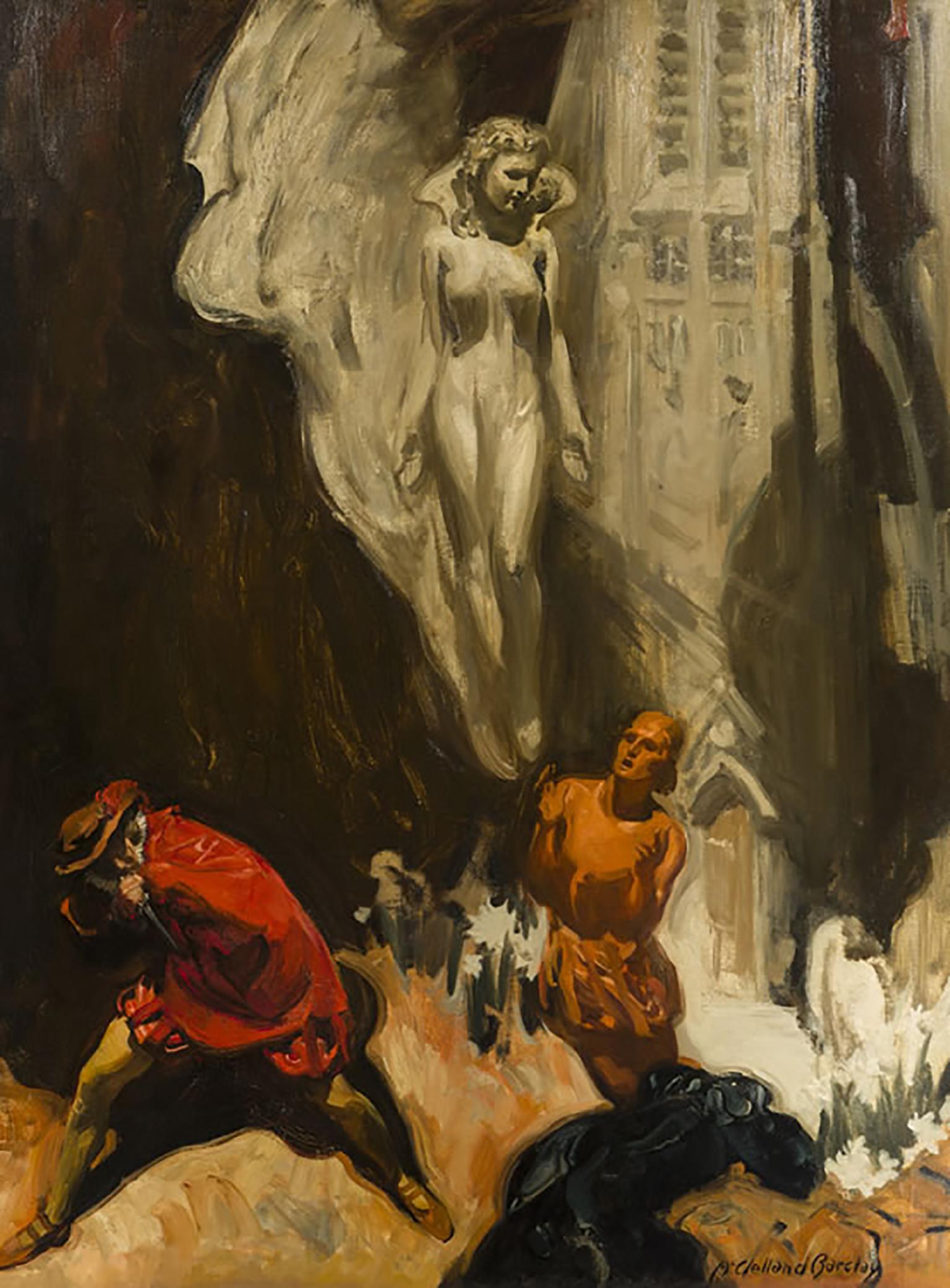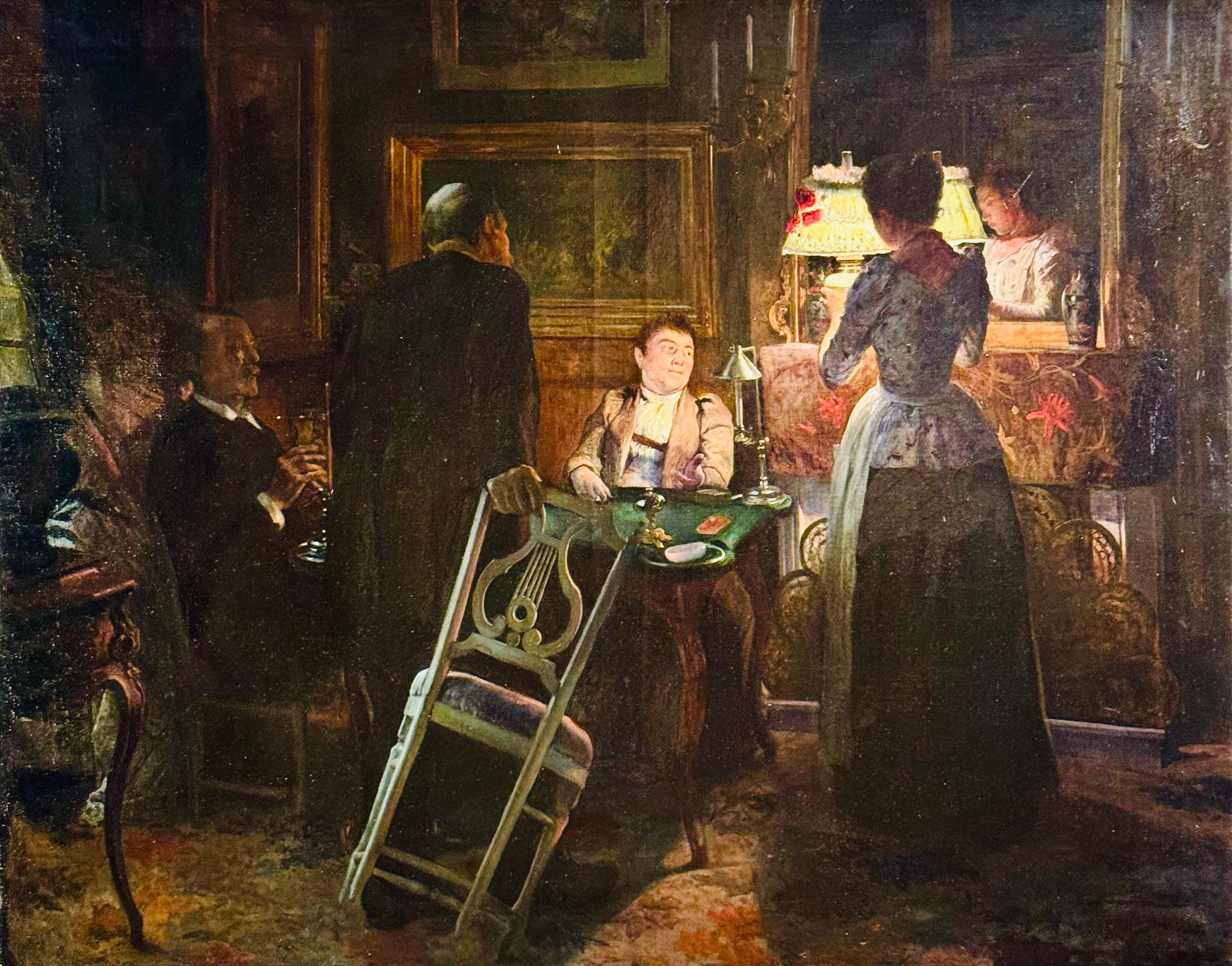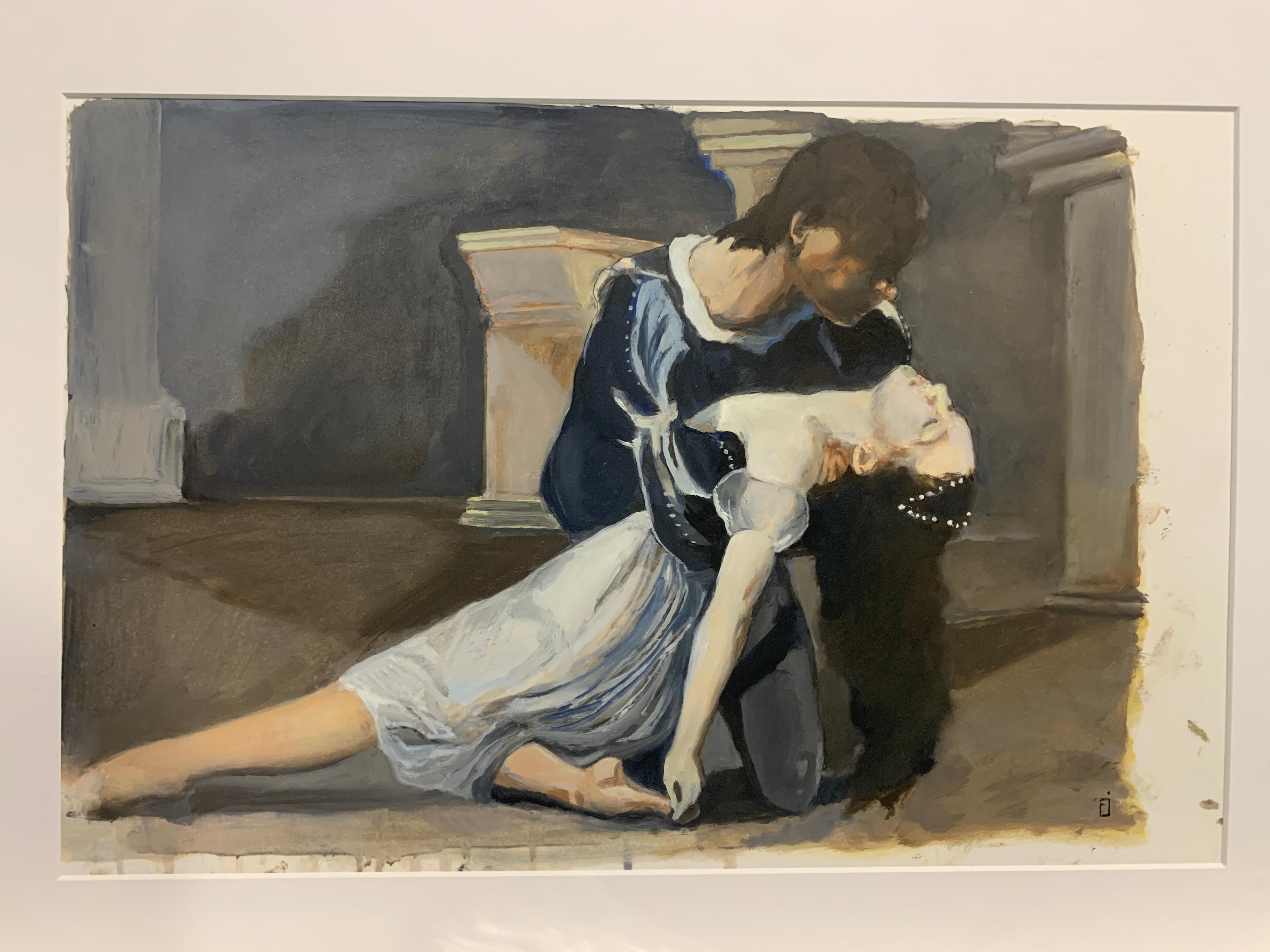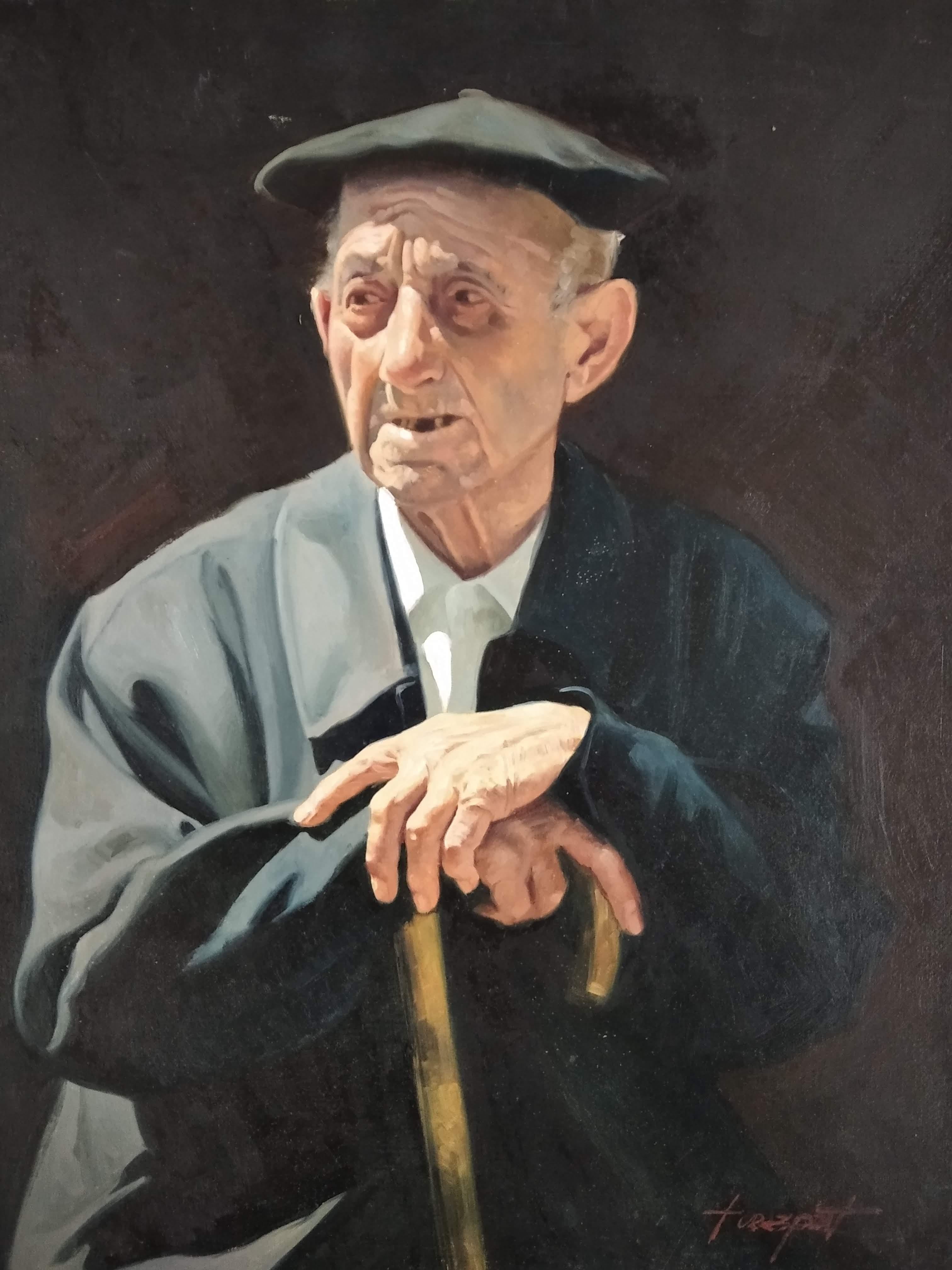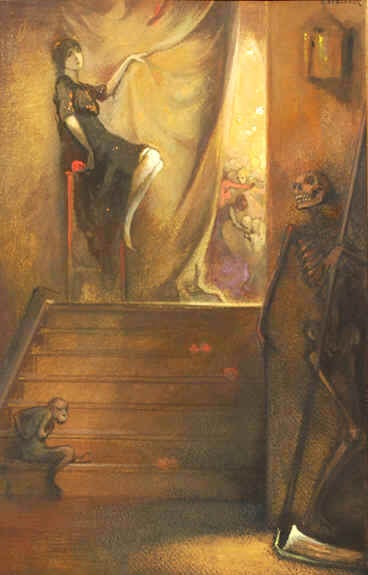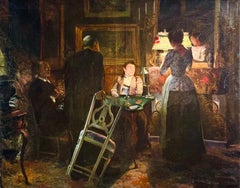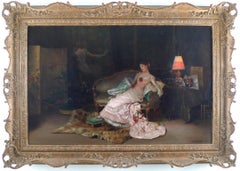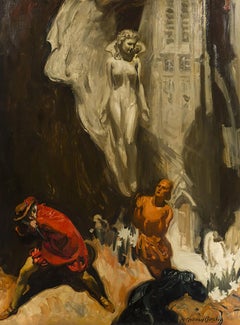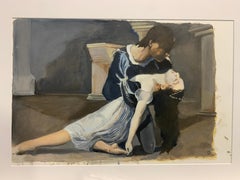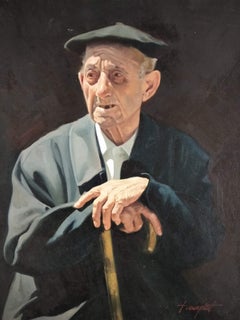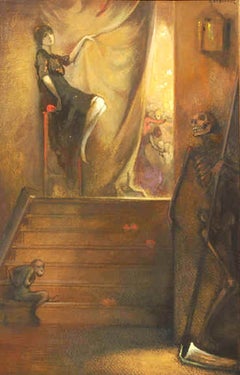Want more images or videos?
Request additional images or videos from the seller
1 of 10
José García y RamosFaust1881
1881
$18,062.79
£13,364.21
€15,000
CA$24,975.03
A$27,419.47
CHF 14,304.79
MX$331,813.72
NOK 179,288.39
SEK 168,936.80
DKK 114,210.42
About the Item
JOSÉ GARCÍA Y RAMOS
Spanish, 1852 - 1912
FAUST
signed "J. García y Ramos" (lower right)
oil on canvas
21-1/2 x 24-5/8 inches (54.5 x 62.5 cm.)
framed: 24-5/8 x 27-3/4 (62.5 x 70.5 cm.)
PROVENANCE
Private Collection, France
José García y Ramos (Seville, 1852-ibídem, 1912) was a Spanish painter and illustrator.
He was a student of the Provincial School of Fine Arts of Seville from a young age, completing his training in the workshop of José Jiménez Aranda, with whom he traveled to Rome in 1872. In that city he made a living with small-format paintings with landscapes and Andalusian characters, having a great acceptance that type of works. In Rome he met Mariano Fortuny who greatly influenced his later work. In 1877 he visited Naples and Venice and in 1882 he returned to Spain after a stay in Paris. In Seville he was appointed professor at the School of Industrial Arts and academic at the Santa Isabel. He also worked as an illustrator in publications such as Artistic Illustration, Spanish and American Illustration, and Black and White.
All of the above indicates the existence of a transition stage in García Ramos' career, between that of his insistent presence in the illustrations of widely publicized publications - in which the genre of manners would take the genre to its highest level of quality - and the last of his life, characterized by a certain mood decay and well differentiated by the recurrent use of brown tones (1900-1912). Now it reflects a latent self-absorption and an outstanding pictorial technique, as if the artist only wanted to recreate himself in the embodiment of the models as an adequate excuse for the development, per se, of his painting. Precisely, when he undertook the execution of these canvases, he was the most pre-eminent painter of his time in Seville - a position that he gladly shared with his admired José Jiménez Aranda, something that proves his appointment as a permanent academic of the Real de Bellas Artes de Santa Isabel of Hungary from Seville in 1893, after having attracted the attention of the officers within the self-managed, artistically speaking, Free Academy of Fine Arts of Seville since its foundation in 1872.
Indeed, in the last decade of the nineteenth century, favorable circumstances arose for this position at the top of the Sevillian School of Painting by coinciding chronologically with the autumnal time of Eduardo Cano de la Peña, his own academic teacher, since the person who would inspire him formally, would be Jiménez Aranda. Cano was the artist who personified Seville's official status to a high degree during the previous twenty years, which correspond, in effect, to the stage in which García Ramos was trained and later tried his luck with the painting of casacón in Rome (1872-1875, 1877 -1880), Paris (1881) and other places in Spain, almost always following Jiménez Aranda. When García Ramos settled in Seville at the end of the century, his artistic consecration came as a consequence of the alternative that he proposed with the practice of costumbrista painting, a typology that disabled in the daily scene of the city of the Guadalquivir the two great international tendencies of his own. from previous decades: the History painting by Eduardo Cano and the Casacón painting by Jiménez Aranda, the latter recently renamed as Neo-Rococo painting. García Ramos' invitation was a new manners, far from the romantic and murillista that, between 1830 and 1870, approximately, the Domínguez Bécquer, the Cabral Bejarano or the Hispaletos displayed. His was, on the other hand, a realistic manners, which did not reproduce the image of Seville created by foreign travelers –and which only existed in their travel literature and in the painting that they commissioned on purpose–, but the daily and real that , with popular grace, it still occurred frequently and naturally in certain urban enclaves.
He died in 1912 in Seville.
- Creator:José García y Ramos (1852 - 1912)
- Creation Year:1881
- Dimensions:Height: 21.46 in (54.5 cm)Width: 24.61 in (62.5 cm)
- More Editions & Sizes:54.5 x 62.5 cm.Price: $18,063
- Medium:
- Movement & Style:
- Period:
- Condition:
- Gallery Location:Madrid, ES
- Reference Number:1stDibs: LU1281115777492
About the Seller
5.0
Vetted Professional Seller
Every seller passes strict standards for authenticity and reliability
Established in 1977
1stDibs seller since 2019
21 sales on 1stDibs
Typical response time: 3 hours
- ShippingRetrieving quote...Shipping from: Madrid, Spain
- Return Policy
Authenticity Guarantee
In the unlikely event there’s an issue with an item’s authenticity, contact us within 1 year for a full refund. DetailsMoney-Back Guarantee
If your item is not as described, is damaged in transit, or does not arrive, contact us within 7 days for a full refund. Details24-Hour Cancellation
You have a 24-hour grace period in which to reconsider your purchase, with no questions asked.Vetted Professional Sellers
Our world-class sellers must adhere to strict standards for service and quality, maintaining the integrity of our listings.Price-Match Guarantee
If you find that a seller listed the same item for a lower price elsewhere, we’ll match it.Trusted Global Delivery
Our best-in-class carrier network provides specialized shipping options worldwide, including custom delivery.More From This Seller
View AllPartida de Tresillo
Located in Madrid, ES
JOSÉ JIMÉNEZ ARANDA
Spanish, 1837 - 1903
PARTIDA DE TRESILLO
signed, located & dated “Jz. Aranda / Madrid. 1893.” (lower right)
oil on canvas
31-1/2 x 39-1/3 inches (80 x 100 cm)
unframed
BIBLIOGRAPHY
- This picture being mentioned and illustrated in “LA ILUSTRACION ESPAÑOLA Y AMERICANA”, Madrid, September 15, 1895
- B. Pantorba, José Jiménez Aranda, 1973, p. 75, 203
- José Jiménez Aranda, 1837-1903: Centro Cultural El Monte, Seville, October 2005, illustrated p. 102
EXHIBITED
Madrid National Exhibition of 1895
PROVENANCE
Private Collection, USA
José Jiménez Aranda (7 February 1837 – 6 May 1903) was a Spanish painter and brother of the painters Luis Jiménez...
Category
1890s Realist Figurative Paintings
Materials
Oil, Canvas
The Cardinal's Visit
Located in Madrid, ES
SALVADOR SÁNCHEZ BARBUDO
Spanish, 1857 - 1917
THE CARDINAL'S VISIT
signed, located and dated "Barbudo / ROMA 1902" (lower right)
oil on canvas
22 x 33-2/3 inches (55.5 x 85.5 cm.)
framed: 36-1/2 x 48-1/4 inches (92.5 x 122.5 cm.)
PROVENANCE
Private Collection, Munich
LITERATURE
Visita con el cardenal combines the two most salient characteristics of Sánchez-Barbudo's work: the search for novelty of theme and narrative content, and the use of minutely detailed brushwork and luminosity. Sánchez-Barbudo specialised in elaborate 'costume pictures', delighting the viewer with impressive details finely rendered with dazzling technical virtuosity.
Here, Sánchez-Barbudo depicts a well-to-do bourgeois family receiving a cardinal in their home. The interior, sumptuously furnished in the rococo style, along with the rich costumes and fabrics, are beautifully observed. Yet beyond the high technique lavished upon the composition, the treatment is comic and full of character and suffused with a gently satirising anti-clericalism.
The cardinal, far from getting the attention he expects, is, literally, sidelined, his expression and body language showing his pique. There is no doubt that contemporary collectors and spectators took pleasure in the sight of noble self-respecting figureheads of the church being brought back down to earth. The comedy was appealing, and the message suited the prevailing political mood of an increasingly secular middle-class buying public.
Salvador Sánchez Barbudo was born on March 14, 1857 in Jerez de la Frontera (Cádiz). He was one of the most important Spanish artists of the "casacón" genre, who followed the Fortuny tradition in Rome. During his childhood he was under the protection of the Marquis del Castillo and in 1875 he moved to Seville where he attended the School of Fine Arts, becoming a disciple of José Villegas...
Category
Early 1900s Realist Figurative Paintings
Materials
Canvas, Oil
Feria de Sevilla
Located in Madrid, ES
JOSÉ CAÑAVERAL
Spanish, 1833 - 1894
FERIA DE SEVILLA
signed "JCañaveral / Sevilla 1881." (lower right)
oil on canvas
29-1/3 x 19-1/2 inches (74.5 x 49.5 cm.)
framed: 38-1/2 x 29-1/2 inches (98 x 75 cm.)
PROVENANCE
Privated Collection, Lille, France
José Cañaveral y Pérez (Seville, 1833-Madrid, 1894) was a Spanish painter, brother of the artist Alfonso Cañaveral y Pérez. Born in Seville, he trained artistically at the School of Fine Arts in his city, later he moved to Madrid where he was a disciple of Federico...
Category
1880s Realist Figurative Paintings
Materials
Canvas, Oil
"A Reverie During The Ball", 19th Century Oil on Canvas by Rogelio Egusquiza
By Rogelio de Egusquiza y Barrena
Located in Madrid, ES
ROGELIO DE EGUSQUIZA
Spanish, 1845 - 1915
A REVERIE DURING THE BALL
signed and dated "Rogelio Egusquiza, 1879" (lower right)
oil on canvas
21-3/4 X 3...
Category
1870s Symbolist Figurative Paintings
Materials
Canvas, Oil
"The Florence Sisters", 19th Century Oil on Canvas, Spanish Artist José Villegas
Located in Madrid, ES
JOSÉ VILLEGAS Y CORDERO
Spanish 1844 - 1921
"The Florence Sisters"
signed "Villegas" (lower left)
oil on canvas
33-1/2 X 40-1/2 inches (84.5 X 102.5 cm.)
PROVENANCE
Private Collector, Seville, Spain
José Villegas Cordero (Seville, August 26, 1844-Madrid, November 9, 1921) was a Spanish painter. He directed the Prado Museum between 1901 and 1918.
Biography
He was the brother of the painter Ricardo Villegas Cordero. He began his apprenticeship very young with José María Romero, with whom he remained for two years until entering the School of Fine Arts in Seville, where he was under the tutelage of Eduardo Cano.
In 1860, when he was only 16 years old, he sold his work Little Philosophy for 2,000 reais at the Seville Exhibition. In 1867 he traveled to Madrid, where he entered Federico Madrazo's studio. There he established friendship with painters Eduardo Rosales and Fortuny.
He went regularly to the Prado where he copied Velázquez, from whom he acquired spontaneity and the use of color for his technique.
Finally, and out of admiration for Fortuny's orientalist painting, he returned to Seville and organized an excursion to Morocco.
At the end of 1868 he decided to travel to Rome accompanied by the painters Rafael Peralta and Luis Jiménez Aranda...
Category
Late 19th Century Realist Figurative Paintings
Materials
Canvas, Oil
Gens du cirque
By Emilio Grau Sala
Located in Madrid, ES
EMILIO GRAU SALA
Spanish, 1911 - 1975
GENS DU CIRQUE
signed "Grau Sala" (lower right)
signed, titled, located and dated "Grau Sala / Gens du cirque / París 72" (on the reverse)
oil o...
Category
1970s Post-Impressionist Figurative Paintings
Materials
Canvas, Oil
You May Also Like
Faust, Original Illustration
By McClelland Barclay
Located in Fort Washington, PA
Original Faust illustration
Medium: Oil on Canvas
Signature: Signed Lower Right
Sight Size 40.00" x 30.00;" Framed 52.00" x 42.00"
Signed lower right: McClelland Barclay, titled b...
Category
20th Century Figurative Paintings
Materials
Canvas, Oil
Untitled II
Located in Toronto, ON
14" x 11" Unframed
Mixed Media on Paper
Hand Signed by Rachel Isadora
Category
2010s Contemporary Figurative Paintings
Materials
Paper, Acrylic
Untitled
Located in Barcelona, BARCELONA
The painting is being offered with a work and authenticity certificate
Category
1990s Realist Portrait Paintings
Materials
Canvas, Oil
L'irreparable
By Jan Frans Deboever
Located in West Hollywood, CA
Belgian Symbolist artist Jan Frans DeBoever (1872 – 1949), created symbolist/allegorical paintings throughout his lifetime. He centralized on allegorical and literary subjects, ge...
Category
1910s Symbolist Figurative Paintings
Materials
Mixed Media
Price Upon Request
Fuenteovejuna
Located in Barcelona, BARCELONA
Figurative work
Category
2010s Realist Figurative Paintings
Materials
Oil
The Letter
Located in San Francisco, CA
This artwork "TheLetter" c.1970 is an oil painting on canvas by Spanish artist Miguel Montaner, 1917-2006. It is signed at the lower right corner by t...
Category
Late 20th Century Realist Figurative Paintings
Materials
Oil
More Ways To Browse
Antique Invitations
Neo Rococo
De La Pena
Signed Garcia
Jose Garcia
Jimenez Aranda
Jose Garcia Y Ramos
Samantha Millington
Snowman Painting
Surrealist Water Paintings
The Scream Munch
Three Graces Oil Painting
Torah Paintings
Vintage Woman With Umbrella
Violin Player
Woman In Red Hat
1700s Oil Painting
18th Century Italian Artists
